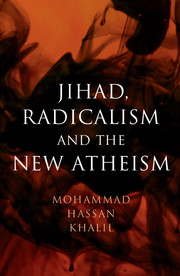Introduction
Published online by Cambridge University Press: 12 December 2017
Summary
In the midst of a lively televised exchange between journalist Fareed Zakaria and author Sam Harris on the topic of jihad, Zakaria declared, “The problem is you and Osama bin Laden agree … after all, you're saying … his interpretation of Islam is correct.”
“Well,” Harris responded, “his interpretation … this is the problem. His interpretation of Islam is very straightforward and honest and you really have to split hairs and do some interpretive acrobatics in order to get it … to look non-canonical.”
This exchange took place a little more than thirteen years after bin Laden and his associates masterminded the deadliest terrorist operation on American soil. In the immediate aftermath of the September 11, 2001, tragedy, the notion that such violence was representative of the world's second-largest religion was widespread enough to prompt then American president George W. Bush to counter that Islam “is a religion of peace.” Numerous skeptics have since dismissed this claim, some viewing it as nothing more than a politically correct token. Among the skeptics are individuals known as “New Atheists,” a label given to popular figures such as Harris who have produced influential anti-theistic and anti-religious works in the years following the September 11 attacks and who focus much of their attention on “the problem with Islam.”
Some New Atheist writers were themselves profoundly transformed by 9/11. In the case of the prominent ex-Muslim writer Ayaan Hirsi Ali, for instance, her doubts about Islam were supplanted by nonbelief when she found it “impossible” to discount bin Laden's “claims that the murderous destruction of innocent (if infidel) lives is consistent with the Quran.” As for Harris, he reportedly began writing his landmark book The End of Faith on September 12, 2001. In this best seller, Harris writes that the feature of Islam “most troubling to non-Muslims” is the very principle bin Laden invoked to justify 9/11: jihad.
As Islamic studies scholar Michael Bonner observes, in contemporary debates on Islam, “no principle is invoked more often than jihad.” Muslims generally understand jihad to be a noble “struggle” or “striving” for the sake of God. It comprises various actions, from fighting on the battlefield to endeavoring to attain inner peace in the prayer hall.
- Type
- Chapter
- Information
- Jihad, Radicalism, and the New Atheism , pp. 1 - 4Publisher: Cambridge University PressPrint publication year: 2017



